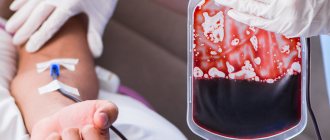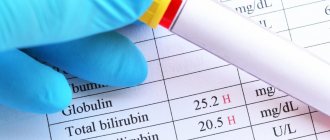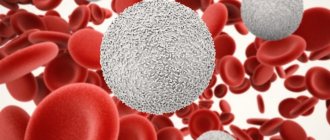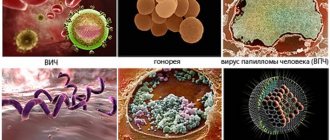Basic liver functions
The liver is a vital organ that performs many functions in the body.
The liver is the largest gland in the human body; it is located in the abdominal cavity under the diaphragm and occupies almost the entire upper right section of the abdominal cavity.
One of the main functions of the liver is detoxification of the body - neutralization and removal of toxic substances entering the blood from the outside (alcohol, medications, toxins formed during the life of pathogens, etc.).
The liver also rids the body of toxic products formed during the metabolic (ammonia, phenol, ethanol, acetone, protein breakdown products, etc.). The liver is involved in the regulation of water metabolism and in the synthesis of immunoglobulins, antibodies and other important proteins of the immune system.
The liver synthesizes bile and enzymes that are involved in digestion processes. The organ regulates the exchange of amino acids and biologically active substances (vitamins and hormones). It is in the liver that sugar is stored in the form of glycogen and, if necessary, when the sugar level in the blood becomes too low, it is broken down and converted into glucose, which enters the blood.
The variety of functions of the liver determines one of the main roles of the organ in the human body. Therefore, its proper operation allows you to maintain the health of the whole body. However, the liver is an extremely vulnerable organ that is influenced by various factors.
Important! Information from the article cannot be used for self-diagnosis and self-medication! Only a doctor can prescribe the necessary examinations, establish a diagnosis and draw up a treatment plan during a consultation!
How does Covid affect the liver?
Scientists have found that coronavirus directly affects the human liver , as pathological studies in patients with COVID-19 confirmed the presence of the virus in liver tissue.
According to scientists' research, the SARS-CoV-2 virus enters the host cell through the interaction of its S protein and the human membrane protein ACE2 . The ACE2 receptor is widely distributed in the cells of the heart, pancreas, intestinal epithelium, kidneys, endothelium of blood vessels, etc., so infection with coronavirus leads to systemic damage to the human body.
Studies have shown that the epithelial cells lining the bile ducts (cholangiocytes) contain the membrane protein ACE2, the SARS-CoV-2 virus binds to ACE2 on cholangiocytes, leading to their dysfunction. As a result, liver cells are destroyed. Under the influence of the SARS-CoV-2 virus, the barrier and transport function of bile acids of cholangiocytes deteriorates. Which leads to inflammation of the liver and the appearance of blood clots in the vessels of the organ.
In addition to direct damage to the liver by the coronavirus, damage to the organ occurs due to a violent immune reaction of the body , resulting in a powerful release of cytokines (proteins that are produced by immune cells in response to infection entering the body).
When cytokine levels are high, systemic inflammation develops : the more cells there are, the more cytokines are released, which means more new immune cells arrive. , reactive hepatitis may develop .
Liver damage due to coronavirus also occurs due to hypoxia (oxygen starvation), which develops against the background of pulmonary failure . Hypoxia that occurs during pneumonia is the cause of ischemic liver damage in patients with coronavirus infection. A decrease in oxygen content under hypoxic conditions can lead to the death of liver cells.
Also, complications on the liver after coronavirus are caused by medications : antibiotics, antiviral, antipyretic, hormonal, anti-inflammatory and drugs of other groups used in the treatment of COVID‑19. Many of the medications that are recommended for the treatment of coronavirus have a toxic effect on the liver, thereby causing liver damage.
The course of coronavirus infection is closely related to the degree of liver damage. In mild or asymptomatic cases of COVID-19, liver dysfunction is considered mild and recoverable. In this case, changes in liver enzymes are temporary and reversible. In patients with severe disease, significant impairment of liver function is more often detected.
Scientists also note that chronic liver diseases (chronic viral hepatitis, cirrhosis, non-alcoholic fatty liver, etc.) worsen the prognosis of COVID‑19. For example, patients with chronic hepatitis B who are infected with coronavirus may need more time to clear the virus from the body. Patients with a history of liver disease have a significantly increased risk of liver damage after coronavirus.
Symptoms of liver damage after coronavirus
One of the common symptoms in patients indicating liver problems after Covid is yellowness of the skin and sclera (the white membrane of the eye).
This condition is called jaundice . Jaundice develops as a result of the accumulation of bilirubin in the blood and tissues of the body.
Bilirubin is a pigment that is a component of bile and is formed in the spleen and bone marrow during the breakdown of red blood cells. Due to the increased volume of bilirubin, urine color also changes - it becomes darker.
A white coating on the tongue after coronavirus will also be an alarming symptom that may indicate liver dysfunction.
If the liver functions abnormally, the organ may increase in size . An enlarged liver after Covid can cause a feeling of heaviness in the abdomen, pain in the right side, and a feeling of constriction in neighboring organs. The liver itself cannot hurt due to the fact that it does not have pain receptors. Pain in the liver during coronavirus as a symptom is caused by stretching of the liver capsule, and pain may also be associated with pressure from the enlarged liver on neighboring organs.
Symptoms such as nausea, bitter belching, bloating, bowel movements, increased gas formation, a feeling of bitterness and an unpleasant taste in the mouth occur when the flow of bile, which is required for the digestion of fats, is disrupted. Vomiting bile during coronavirus may indicate severe intoxication of the body.
When, when the liver is damaged, the organ fails to cope with its cleansing function, poisons and toxins penetrate into the blood; in this condition, a person may experience malaise and weakness , as well as itching of the skin .
A dangerous symptom is considered a rich dark color of the stool . As a rule, this symptom occurs in the later stages of liver disease, when bleeding opens in the gastrointestinal tract.
Swelling as a symptom of liver damage after coronavirus can occur when protein (albumin) synthesis is disrupted, which leads to the release of fluid from the vessels and capillaries into the tissue. Bleeding and bruising on the body is associated with the inability of the liver to synthesize the required amount of proteins to ensure normal blood clotting.
Doctors also identify the following symptoms for liver problems:
- constant thirst;
- change in color of nails on fingers and toes;
- decreased appetite and weight loss.
- If you have had COVID-19 and are bothered by one or more of the above symptoms, contact your primary care physician immediately for advice.







